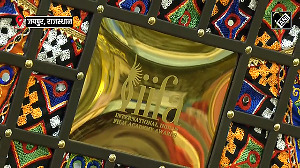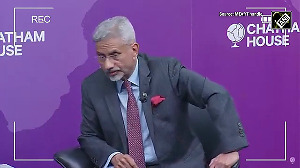With new revelations almost daily, the Volcker report drama continues to rock India's political circles, in general, and the ruling United Progressive Alliance government, in particular.
New names are cropping up everyday, with new allegations. If the rapid turn of events has left you a little confused, here is a quick guide to the key players in the oil for food scandal, as far as India is concerned.
Paul Volcker: Before the oil for food report, he was best known as the chairman of the American Federal Reserve from 1979 to 1987, when Jimmy Carter and Ronald Reagan were President.
Volcker is credited with having stemmed an inflation crisis in America in the 1980s.
Natwar knew about oil deals: Mathrani
In April 2004, the United Nations gave him the task of investigating charges of corruption in the oil-for-food programme the UN had devised to help sanction-riddled Iraq to survive.
K Natwar Singh: India's former external affairs minister and veteran Congress leader.
The Volcker report says Iraq 'selected oil recipients in order to influence foreign policy and international public opinion in its favour.' Thus the oil vouchers went to prominent pro-Iraq global voices, who the report classifies as 'non-contractual beneficiaries'.
These 'non-contractual beneficiaries', in turn, sold the vouchers to oil companies who bought oil at UN-prescribed low prices.
Natwar is one of the Indian non-contractual beneficiaries named in the Volcker report. The others are Jammu and Kashmir Panther's Party leader Bhim Singh, and the Congress party.
Mathrani revelations rock Parliament
Natwar has maintained he had no role in the oil-for-food scam.
Jagat Singh: Natwar's son and Congress legislator from Lachhmangarh in Alwar, Rajasthan. He has admitted he visited Saddam Hussein's Iraq, but maintains he did so as part of a Youth Congress delegation, and not for personal gains through the oil-for-food scam, as has been alleged.
Jagat is not a stranger to being in the news for all the wrong reasons. His name figured prominently in the media when his wife Natasha and sister Ritu committed suicide within two months of each other in 2002.
Andaleeb 'Andy' Sehgal: Sehgal owns Hamdan Exports, which was named in the Volcker Report for paying $748,540 as illegal surcharge payments on behalf of Masefield AG, a Swiss oil company.
According to the Volcker Report, Masefield bought Iraqi oil against coupons given to Natwar Singh and Congress.
Natwar Singh's son Jagat Singh's close friend and relative. Sehgal's brother-in-law Jayatendra Singh's father and Natwar Singh's wife are cousins.
Mathrani recalled as envoy to Croatia
Aneil Mathrani: He served for over 20 years in the All India Congress Committee's foreign affairs department, and helped the party develop ties with political parties across the globe.
When the United Progressive Alliance government was sworn in, Mathrani was made officer on special duty in the ministry of external affairs. He was the Indian Ambassador to Croatia, till he was recalled on Friday, following his disclosures to a television channel that Natwar was fully aware of the oil-for-food scam.
Mathrani was secretary of the Congress' foreign cell when Natwar Singh was its chairman. According to reports, Mathrani flew to Jordan on January 18, 2001, the same day as Natwar's son Jagat Singh did. Reports also say Mathrani flew back to Jordan in April the same year.
The visits almost coincide to when the Volcker Committee says 'illegal surcharge' payments were made in the Jordan National Bank.
'India has done the right thing on Volcker report'
Saddam Hussein: Iraqi dictator overthrown by America's Operation Iraqi Freedom. After Saddam's Iraq invaded neighbouring Kuwait in 1990, the UN imposed economic sanctions on the country.
In the face of a global appeal to save the people of Iraq from bearing the brunt of the sanctions on its dictatorial regime, the UN started the oil-for-food programme in December 1996.
Under the programme, Iraq could sell its oil at UN-prescribed prices in exchange of humanitarian goods. Iraq sold $64.2 billion worth of oil to 248 companies and 3,614 firms sold $34.5 billion worth of humanitarian goods to Baghdad before the programme ended in 2003.
Saddam's regime devised an elobarate scheme to pilfer money from the oil-for-food programme, the full details of which came to light with the Volcker Committee report.
B S Raghavan: Hurdles remain for Volcker probe
Tariq Aziz: He was the deputy prime minister in the Saddam regime, and the only Christian in the deposed dictator's inner circle. Aziz was the Saddam regime's global face, before America invaded Iraq.
It is now being alleged that the kickbacks received by the Indian non contractual beneficiaries -- read former external affairs minister Natwar Singh -- came after a series of meetings Natwar, his son Jagat Singh, and family friend Andy Sehgal had with Aziz and other Baath Party officials.






 © 2025
© 2025